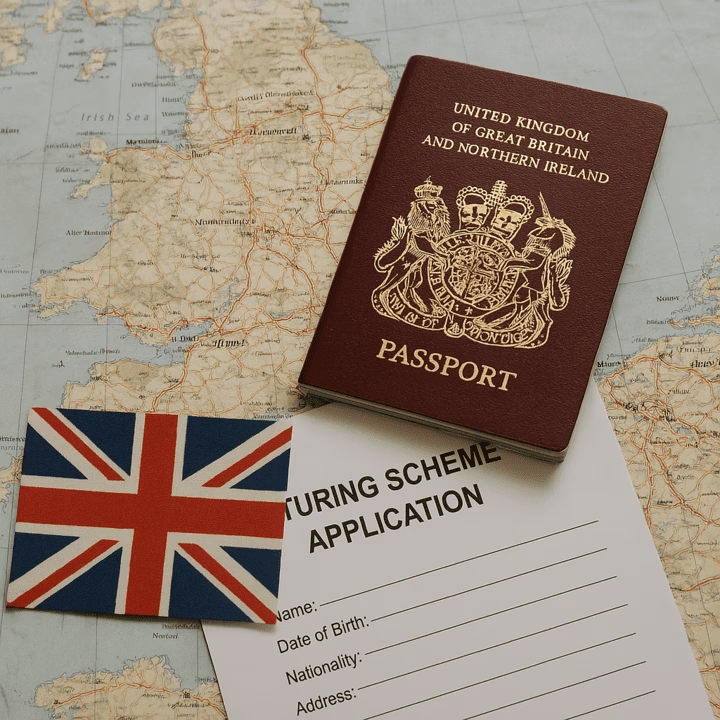🔎 Recap
Just need the essentials? Here’s a quick summary to get you ready for your Erasmus in France.

Introduction
Are you about to live the Erasmus experience in France? Congratulations, an exciting year full of discoveries and unforgettable memories awaits you! But before you unpack your bags, there are a few essential steps to follow to ensure everything goes smoothly.
In this article, we’ll guide you through the 6 key steps to prepare for your Erasmus experience in France: from choosing your destination to managing your budget, and from campus integration to travel tips.
Ready? Let's go! ☺️
Step One: Choose Your Destination
France offers plenty of great destinations for your Erasmus exchange, each with its own unique character. Whether you prefer a bustling city or a quieter vibe, there’s something for everyone. Here’s a glimpse of the cities where you could settle:
Paris: The Capital
Paris is where everything happens! The city is full of life with countless cultural activities, museums, concerts, and events. It’s a cosmopolitan city that never sleeps, but be aware that the cost of living, especially housing, can be quite high.
Lyon: Friendliness and Gastronomy
Lyon is a pleasant city to live in, ideal for combining studies and leisure. Known for its gastronomy, you'll find plenty of delicious food to enjoy. Plus, Lyon is just a short distance from the Alps—perfect if you want to hit the mountains in winter or explore the surrounding areas on weekends.
Toulouse: The Pink City
Toulouse, or “La Ville Rose,” is a warm and lively place. Located in the heart of Occitanie, it’s also close to Spain, with Barcelona only a few hours away by train. It’s a great city for students who enjoy energy and sunshine.
Strasbourg: A City at the Heart of Europe
Strasbourg is a charming city, with a mix of French and German cultures. It’s also a great base for discovering Europe, with major capitals like Frankfurt or Brussels just a few hours away.
Rennes, Nantes, Montpellier: Young and Dynamic Cities
- Rennes, a very student-friendly city, is on the doorstep of Brittany. It’s a region worth exploring, especially in spring and summer, with its coastal landscapes and unique vibe.
- Nantes is a culturally rich city, where you can explore iconic places like the Machines de l'île, an amazing adventure for art and technology enthusiasts.
- Montpellier will charm you with its pleasant climate and plenty of activities perfect for enjoying the outdoors.
→ This is just an overview! For more information, check out our “Where to Study in France?” section and discover all the student cities in France ✌️
Start planning your stay in France with the Student Hub 🙌

Step Two: Define Your Budget
Going on Erasmus also means managing your budget well to fully enjoy your time abroad. With expenses for housing, food, transportation, and leisure, it’s essential to define your budget from the start to avoid unpleasant surprises.
Cost of Living in France
The cost of living varies greatly from city to city. Here's an estimate of monthly expenses depending on where you choose to live:
- Paris: €1,000 to €1,500 per month.
Paris is the most expensive city, especially when it comes to housing. It's important to prepare your budget well if you choose the capital as your Erasmus destination. - Lyon, Bordeaux, or Nice: €800 to €1,200 per month.
These large cities are a bit cheaper than Paris, but the cost of living remains relatively high, particularly for housing. - Nantes, Toulouse, Strasbourg, and other regional cities: €700 to €1,000 per month.
These cities offer a good balance between quality of life and reasonable costs, while still being accessible for students.
Financial Aid Available
To help you manage your budget, several aids are available:
- Erasmus+ Grant: A monthly allowance ranging from €150 to €500, depending on your home country. For more details, ask your university’s Erasmus+ coordinator.
- APL (Personalized Housing Assistance): This aid covers part of your rent and is available to international students under certain eligibility conditions. Check if you can benefit from it to lower your expenses.
Student Benefits Not to Miss
As a student, you can take advantage of numerous discounts and benefits:
- Transportation: Young person’s SNCF card, regional passes, and discounts on trips.
- Culture and Leisure: Reduced prices for museums, cinemas, theaters, and even some gyms. Always have your student ID with you to benefit from these discounts.
With proper planning, you’ll be able to enjoy your Erasmus experience while keeping your finances under control.
Step Three: Find Your Accommodation
Finding accommodation is often the most stressful part of the preparation process. It also takes the most time, especially in big cities like Paris or Lyon, where the market is (very) tight! Fortunately, several options are available.
Student Residences: Simple and Practical
Residences managed by the CROUS or private operators offer furnished housing near campuses.
- Advantages: Affordable rent. €150 to €450 for CROUS residences, €400 to €750 for private residences.
- Disadvantages: Limited availability, application process required several months in advance.
Shared Accommodation: Friendly and Affordable
Shared accommodation is very popular with students as it allows you to meet people (French or international students) and save money by sharing most of the bills (electricity, gas, internet, etc.).
- Advantages: Great for meeting people, cost-effective.
- Important: Make sure your name is on the lease to qualify for APL.
Where to Search: Recommended Sites and Platforms
- Lokaviz: For CROUS residences.
- Le Bon Coin, Studapart, or SeLoger: For rentals.
- La Carte des Colocs or Appartager: For shared housing.
- Social Networks: Facebook and WhatsApp groups for your school.
The Importance of a Strong Rental Application
A solid rental application is essential to convince landlords and agencies in France, especially in large cities where demand is high. Preparing all the necessary documents in advance can significantly speed up the process and give you an advantage over other candidates. 😉
Your rental application should include the following documents:
- ID: Passport or ID card.
- Proof of Enrollment: Student card or registration certificate.
- Financial Proof: Proof of income (pay slips, tax notices) or your guarantor’s documents.
- Guarantor: Required for most housing, with options like Visale or Garantme if you don't have a guarantor in France.
⚠️ Important: Having a French bank account is often required for recurring payments like rent or utilities. Also, prepare several printed and digital copies of your application for your visits.
Step Four: Your Campus Integration
Once your accommodation is sorted, finalize your integration on campus.
Administrative Formalities
- Validate your Learning Agreement and register for courses.
- Pay the CVEC (Student and Campus Life Contribution).
- Obtain your enrollment certificate and student card.
Buddy System
Many universities participate in the Buddy System program, where a local student becomes your mentor to help you integrate more easily. We highly recommend applying for this—it’ll make your first weeks in France much smoother!
Student Associations and Events for International Students
- Welcome Week: Most universities organize “welcome weeks” to help you with all your administrative tasks. Contact the service responsible for international students to find out which events are planned for the start of the semester.
- Integration Parties, Cultural Outings: Associations like ESN France organize lots of events so you can meet other international students.
Step Five: Essentials for Student Life
European Health Insurance Card (EHIC)
If you’re from the EU, make sure to apply for the European Health Insurance Card before you leave. It allows you to receive medical care in France at no extra cost, under the same conditions as a French resident. This card is free and crucial to avoid having to take out additional health insurance.
Local Bank Account
To pay rent, subscribe to services, or receive aids like APL, you’ll need a bank account with a French IBAN. Online banks like N26, Revolut, or BNP Paribas are the most convenient for international students: you can open your account online for free.
SIM Card
Lebara, B&YOU or Red by SFR offer affordable prepaid plans (starting at €7/month) with no contract—perfect for short stays.
Transport
Order your local transport card to use metro, buses, trams, and/or bikes.
Step Six: Enjoy Your Erasmus in France!
Once you’re settled, it’s time to really enjoy your stay in France and discover all that the country (and Europe) has to offer!
Travel in France
France is full of great destinations for Erasmus students! Between bustling cities and picturesque villages, there are countless ways to explore the country, depending on your budget and interests.
Before you head out on your adventures, don’t forget to plan your trips in advance and take advantage of student discounts available. Whether you want to explore classic destinations like Paris or discover lesser-known places, here are a few tips on transportation.
🔎 Must-see Destinations:
- Classics: Paris and its monuments, Mont-Saint-Michel, or the Christmas market in Strasbourg.
- Nature and Adventure: Hiking in the Alps, walking through Bordeaux’s vineyards, or relaxing on the French Riviera beaches.
- Charming Cities: Lyon, Marseille, Nantes, Lille… each with its own style and unique vibe.
🚌 Travel Easily in France:
- Train: SNCF offers fast journeys between major cities. With the Avantage Jeune card (€49/year), you get 30% off tickets.
- Buses: Companies like FlixBus or BlaBlaCar Bus offer affordable trips—perfect for tight budgets.
- Carpooling: BlaBlaCar is very popular in France. Not only is it a cheap way to travel, but you also get to meet other travelers and practice your French.
Explore Europe
France is at the heart of Europe, making it an ideal base for discovering the continent. Whether you dream of visiting neighboring capitals or exploring lesser-known spots, traveling around Europe is simple and relatively affordable for students.
Before you head out, check the visa requirements for non-Schengen countries if you're not an EU citizen.
💡 Travel Tips:
- Low-cost Flights: Ryanair, EasyJet, and Vueling offer cheap tickets for popular destinations. Book in advance and you can find round trips for under €50. But watch out for extra fees for baggage or seat selection.
- Trains: If you prefer to avoid flying, trains offer a comfortable and eco-friendly alternative. The Interrail Pass allows you to travel unlimited in over 30 European countries.
- Buses and Carpooling: For shorter trips, services like FlixBus or BlaBlaCar offer affordable and flexible options. Ideal for reaching neighboring cities like Barcelona, Brussels, or Geneva.
👉 Essential Tools:
- Omio or Rome2Rio: Compare transport options to find the quickest or cheapest routes.
- Hostelworld: Find affordable hostels for your stays.
Conclusion
To properly prepare for your Erasmus experience in France, we recommend starting 2 to 3 months in advance. Begin with these 6 steps, and don’t hesitate to use the resources available through your university or the student associations on your campus.
Need a little extra help? Our community helpers are here to assist. We also encourage you to create an account on the International Student Hub — it’s free!
Good luck with your preparations! 🙌









